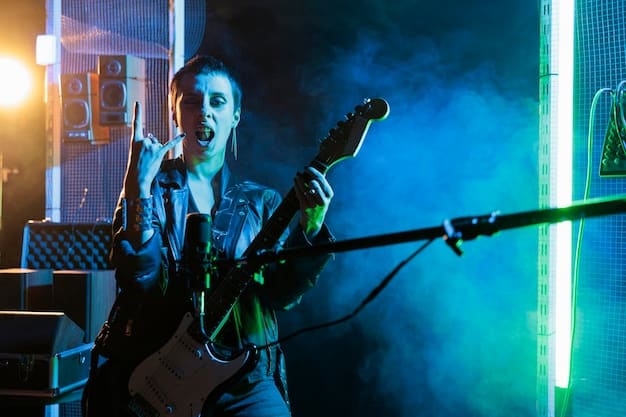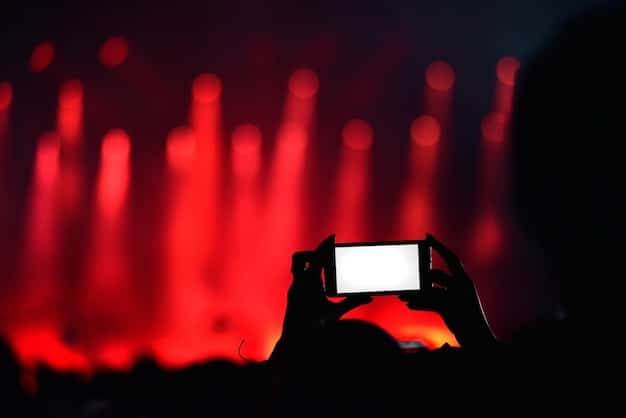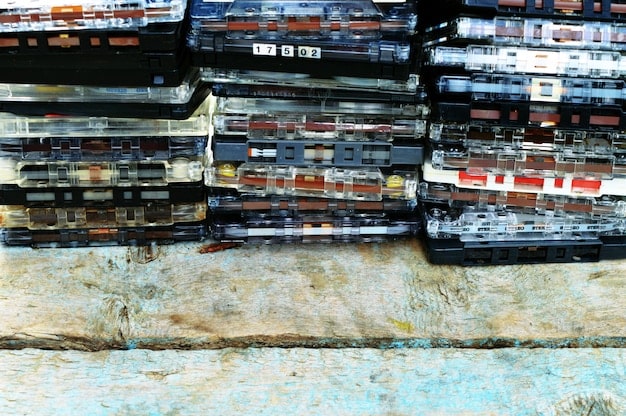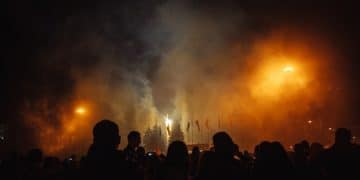Concert Bootlegs: Ethics, Legality & Heavy Metal Performances

Concert bootlegs, particularly in the realm of heavy metal performances, raise complex questions regarding the ethics of unauthorized recording and distribution, as well as the legal implications for both fans and artists.
The raw energy of a live heavy metal performance is something truly special, a connection between band and fans that exists only in that moment. But what happens when someone decides to capture that moment without permission, creating a concert bootleg? The ethics and legality of recording heavy metal performances become a complex issue with passionate arguments on both sides.
Understanding Concert Bootlegs
Concert bootlegs are unauthorized recordings of live performances, often distributed through various channels like online forums, torrent sites, and even physical media. These recordings can range in quality from pristine soundboard captures to shaky, muffled recordings made with hidden smartphones.
The practice of creating and sharing bootlegs has existed for decades, evolving alongside recording technology. Before the digital age, bootlegs were typically created using portable tape recorders, requiring significant effort and risk. Today, anyone with a smartphone can potentially create a bootleg, making the practice far more widespread.
The Evolution of Bootleg Recording
The history of concert bootlegs is intertwined with the history of music fandom and technological advancement. Early bootlegs were often traded among dedicated fans, seen as a way to preserve and share unique musical experiences.
Types of Concert Bootlegs
- Audience Recordings: These are typically made with handheld devices or hidden recording equipment, capturing the sound from the venue.
- Soundboard Recordings: These are direct feeds from the mixing console, offering superior audio quality but are less common.
- Video Recordings: With the advent of smartphones, video bootlegs have become increasingly prevalent, capturing both audio and visual aspects of the performance.
The accessibility of recording technology has blurred the lines between personal enjoyment and copyright infringement, leading to ongoing debates about the ethics and legality of concert bootlegs.

The Ethics of Recording Live Performances
The ethical considerations surrounding concert bootlegs are multifaceted, involving the rights of the artists, the expectations of the audience, and the potential impact on the music industry.
Many argue that artists have a right to control how their performances are recorded and distributed. Unauthorized recordings can undermine their ability to profit from their work and can potentially damage their reputation if the quality is poor.
Artist Perspectives on Bootlegs
Some artists tolerate or even encourage bootlegging, viewing it as a form of promotion and a way to connect with their fanbase. Others are fiercely opposed, citing copyright concerns and artistic control.
Fan Perspectives on Bootlegs
Fans often see bootlegs as a way to relive memorable concert experiences and to share their passion for the music with others. They may argue that recording a performance is a harmless act of appreciation, not a form of theft.
- Preserving Memories: Bootlegs allow fans to revisit and share cherished concert memories.
- Sharing the Music: Bootlegs can expose new audiences to an artist’s work, potentially increasing their fanbase.
- Supporting the Artist: Some fans argue that bootlegging doesn’t harm artists, as they would have attended the concert regardless.
Ultimately, the ethical implications of recording live performances depend on individual perspectives and the specific circumstances of each case.
Legal Implications and Copyright Law
The legality of concert bootlegs is governed by copyright law, which grants artists and copyright holders exclusive rights to their creative works. Unauthorized recording, distribution, or sale of copyrighted material can constitute copyright infringement.
Copyright laws vary from country to country, but generally, recording a live performance without the artist’s permission is a violation of copyright. This includes both audio and video recordings.
Copyright Infringement and Penalties
Copyright infringement can result in both civil and criminal penalties, including fines, lawsuits, and even imprisonment in some cases. The severity of the penalties depends on the nature and extent of the infringement.
Fair Use and Educational Purposes
Some argue that bootlegs may fall under the fair use doctrine, which allows limited use of copyrighted material for purposes such as criticism, commentary, news reporting, teaching, scholarship, and research. However, fair use is a complex legal concept, and it’s unlikely that most concert bootlegs would qualify.
Navigating the legal landscape of concert bootlegs requires a thorough understanding of copyright law and its implications for both fans and content creators.
The Heavy Metal Context: A Unique Subculture
The heavy metal subculture has a long and complex relationship with bootlegs. The genre’s DIY ethos and passionate fanbase have contributed to a thriving bootleg scene, with fans often trading recordings and videos through underground networks.
Heavy metal concerts are known for their intensity and energy, making them prime targets for bootleggers. Fans want to capture and share these unique experiences, often regardless of the legal or ethical implications.
The Appeal of Metal Bootlegs
Metal bootlegs offer fans a glimpse into rare or unreleased material, such as live improvisations, cover songs, and backstage moments. They also allow fans to experience concerts that they were unable to attend in person.
Metal Bands’ Stance on Bootlegs
Some metal bands have embraced bootlegging, recognizing its potential to promote their music and connect with fans. Others have taken a stricter approach, seeking to protect their copyright and control the distribution of their performances.
- Promotional Tool: Bootlegs can generate buzz and excitement around a band’s live performances.
- Fan Engagement: Bootlegs can strengthen the bond between a band and its fanbase.
- Copyright Protection: Bands may choose to actively combat bootlegging to protect their intellectual property.
The heavy metal context adds another layer of complexity to the debate surrounding concert bootlegs, highlighting the tension between artistic control and fan appreciation.

Alternatives to Bootlegging: Supporting Artists Legally
For fans who want to support their favorite artists without resorting to illegal bootlegging, there are several legitimate alternatives available.
Purchasing official live albums, concert DVDs, and streaming services provides direct financial support to the artists and ensures that they are compensated for their work.
Official Live Recordings and Merchandise
Many artists release official live albums and concert DVDs, offering high-quality recordings of their performances. These releases provide fans with a legal and ethical way to experience their favorite music.
Supporting Artists Through Streaming Services
Streaming services like Spotify and Apple Music pay royalties to artists based on the number of streams their songs receive. By listening to an artist’s music on these platforms, fans can provide them with financial support.
- Purchase Official Releases: Buy live albums, concert DVDs, and merchandise directly from the artist or their official vendors.
- Stream Music Legally: Use streaming services to listen to your favorite artists and support them through royalties.
- Attend Concerts: Show your support by attending live performances and purchasing tickets.
By choosing legal alternatives to bootlegging, fans can demonstrate their appreciation for the music while respecting the rights of the artists.
Finding a Balance: Respecting Artists and Fans
The debate surrounding concert bootlegs highlights the need for a balance between respecting the rights of artists and fostering a sense of community and appreciation among fans.
While copyright law provides legal protection for artists, it’s important to recognize the cultural significance of bootlegs and their role in preserving musical history. Finding a middle ground that respects both perspectives is essential.
Promoting Ethical Concert Recording Practices
Encouraging fans to seek permission from artists before recording their performances can help to promote ethical recording practices. This can involve obtaining consent from the artist’s management or seeking out official recording opportunities.
Supporting Artists’ Rights While Appreciating Fan Culture
Ultimately, the goal is to find a way to support artists’ rights while still allowing fans to express their passion for the music. This may involve exploring alternative licensing models or finding ways to monetize bootlegs in a way that benefits both parties.
The future of concert bootlegs will likely depend on ongoing dialogue and collaboration between artists, fans, and the music industry, with a focus on finding solutions that are fair and sustainable for all involved.
| Key Point | Brief Description |
|---|---|
| 🎤 Bootleg Definition | Unauthorized recordings of live performances, often shared online. |
| ⚖️ Legal Issues | Copyright law protects artists; bootlegging can infringe these rights. |
| 🤘 Metal Culture | Heavy metal has a strong bootleg tradition, viewed differently by bands. |
| 💰 Alternatives | Support artists legally through official releases and streaming. |
FAQ
▼
A concert bootleg is an unauthorized recording of a live performance, typically made without the explicit permission of the artist or copyright holder. These recordings can vary greatly in quality.
▼
Generally, no. Recording a concert without permission is a violation of copyright law. Artists and copyright holders have the exclusive right to control the recording and distribution of their work.
▼
Fans record concerts for a variety of reasons, including preserving memories, sharing the music with others, and experiencing rare or unreleased material. It’s often seen it as a way to connect with the band.
▼
Artists’ views on bootlegs vary. Some tolerate or even encourage them, seeing them as promotional tools. Others are strongly opposed, citing copyright concerns and the need to protect their artistic control.
▼
Legal alternatives include purchasing official live albums, concert DVDs, subscribing to streaming services, and attending live performances. These options allow fans to support artists legally.
Conclusion
The world of concert bootlegs, particularly within the heavy metal scene, presents a complex interplay of ethical considerations, legal frameworks, and fan culture. While copyright laws protect artists’ rights, the passion and dedication of fans often lead to unauthorized recordings. Finding a balance that respects intellectual property while acknowledging the cultural significance of bootlegs remains an ongoing challenge.





